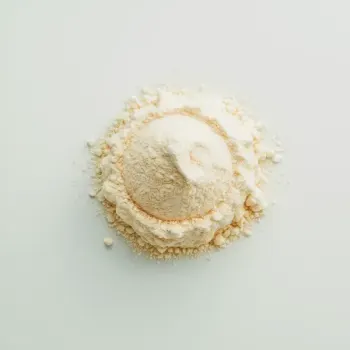Baking Powder is a dry leavening agent that creates air bubbles in baked goods for a light structure, while Eggs are a multi-functional ingredient providing binding, structure, and richness to various dishes.

Baking powder is a dry chemical leavening agent, a mixture of a carbonate or bicarbonate and a weak acid. It's responsible for creating air bubbles in batter or dough, leading to a light and airy structure in baked goods.

Eggs are a versatile ingredient used in various dishes. They can act as binders, leavening agents, or emulsifiers, and contribute to the texture, flavor, and color of the food.
Baking powder and eggs differ primarily in their composition and functions. Baking powder solely acts as a leavening agent, while eggs can provide structure, moisture, and flavor. They also differ in taste and texture; baking powder is tasteless, whereas eggs can enrich the flavor profile of a dish.

Your ultimate Recipe Box, Meal Planner, and Cooking Class all in one
Best used in recipes for cakes, biscuits, and pancakes. Baking powder creates a uniform crumb structure and is essential for recipes without acidic ingredients. Expect a light texture and even rise. Ideal for custards, quiches, and sponge cakes. Eggs provide binding, structure, and richness. Expect a more dense and flavorful result. For lightness, eggs can be separated, and the whites whipped before folding into the batter.
Use in batter for quick breads or dough for scones where a rise is needed without the need for fermentation or eggs. The result will be a tender crumb without egg flavor. Incorporate into dough for pasta or batter for tempura to add richness and structure. The dough or batter will be more pliable and have a richer taste.
Use in waffles or pancakes for a fluffy texture. Baking powder reacts with moisture and heat to create bubbles that make the breakfast treats light and airy. Essential for dishes like omelets or scrambled eggs, which rely on eggs for their primary structure and flavor. Eggs can also be used in French toast batter for richness and binding.
Eggs are a source of high-quality protein and contain essential vitamins and minerals, while baking powder is calorie-free but does not offer significant nutritional benefits.
| Nutrient | Eggs ( per 100g ) | Baking Powder ( per 100g ) |
|---|---|---|
| Fat | 11g | 0g |
| Sodium | 124mg | 10600mg |
| Calcium | 50mg | 587mg |
| Protein | 13g | 0g |
| Calories | 155 | 53 |
| Carbohydrates | 1.1g | 27g |
Yes, but be aware that the cake may have a lighter, possibly less moist texture, and you may miss the richness that eggs provide.
Not all bread recipes require eggs. Eggs can enrich bread and improve texture, but many breads, like baguettes, do not use them.
Baking powder can help cookies rise and spread, resulting in a lighter, softer texture.
Eggs add richness and bind the batter, contributing to a tender, cake-like texture in pancakes.
Yes, but they may lack the typical richness and fudginess associated with brownies. Substitutes like applesauce or mashed bananas can be used to add moisture.